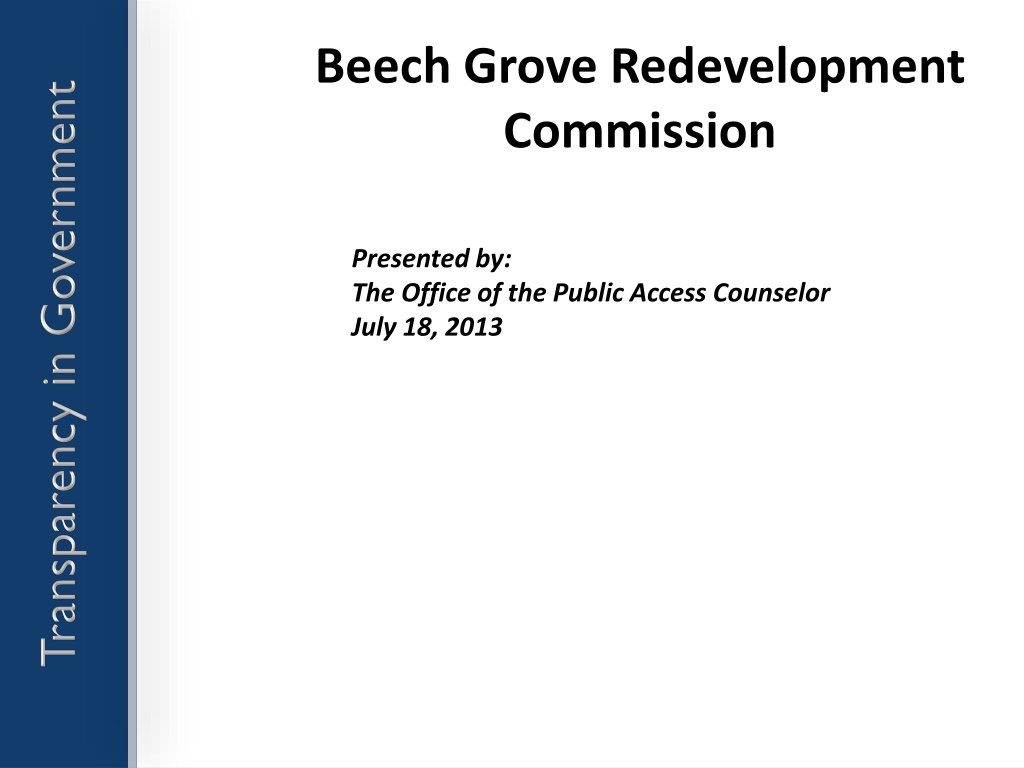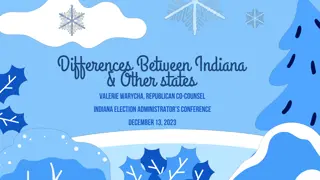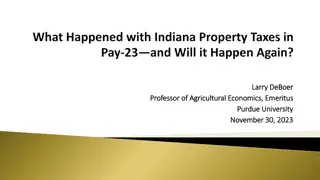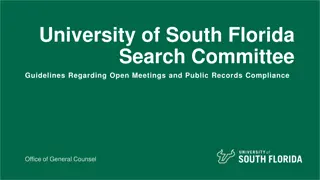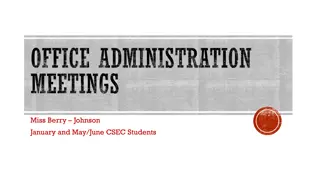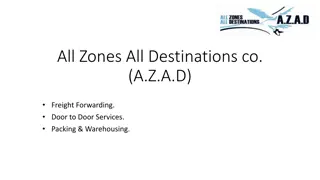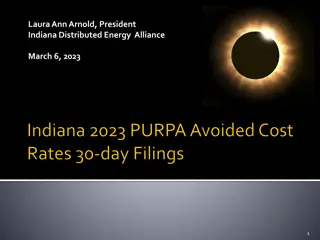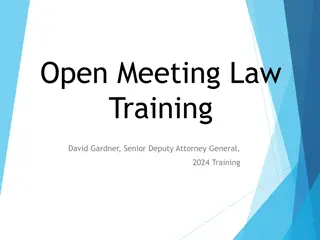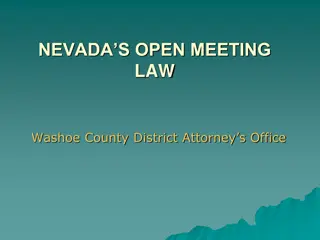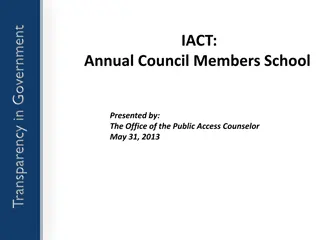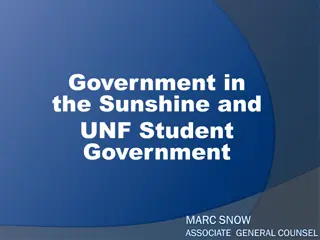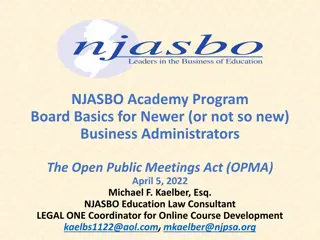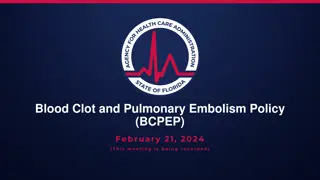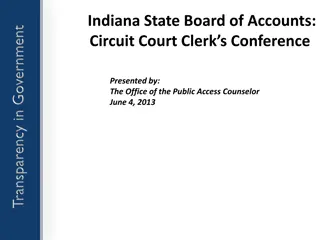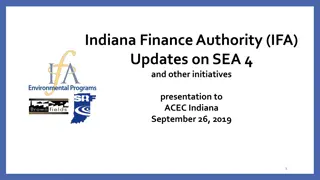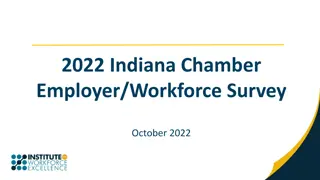Understanding Indiana Open Door Law - Guidelines for Public Agency Meetings
The Indiana Open Door Law (ODL) ensures that official actions of public agencies are conducted openly, allowing the public to be fully informed. This law covers rules for public meetings, executive sessions, rights of attendees, required memoranda, and notice requirements. Compliance with ODL promotes transparency and accountability in the governance process.
Download Presentation

Please find below an Image/Link to download the presentation.
The content on the website is provided AS IS for your information and personal use only. It may not be sold, licensed, or shared on other websites without obtaining consent from the author. Download presentation by click this link. If you encounter any issues during the download, it is possible that the publisher has removed the file from their server.
E N D
Presentation Transcript
Beech Grove Redevelopment Commission Presented by: The Office of the Public Access Counselor July 18, 2013
The Indiana Open Door Law (ODL) It is the intent of this chapter that the official action of public agencies be conducted and taken openly, unless otherwise expressly provided by statute, in order that the people may be fully informed IC 5-14-1.5-1.
Meetings under the ODL General Rule of Thumb: Meetings covered by the ODL are to be open to the public. Exception to the Rule: Executive Sessions Not all meetings are covered by the ODL Governing body of public agency Majority must be present Some gatherings are excluded from ODL Taking official action on public business Includes committees/panels appointed by governing body or its presiding officer
Meetings under the ODL No right to speak under ODL unless some other statute requires it (i.e. public hearings) Do have right to attend and observe meetings Meetings may be taped or recorded but governing body may regulate placement of cameras, microphones etc.
Minutes and Memoranda ODL requires Governing Bodies to keep certain memoranda: Date, time and place Members present or absent General substance of matters discussed/decided Record of all votes, by individual if a roll call vote *Agendas, if used, must be posted prior to meeting *Minutes, if any, must be made available for public inspection
What Kind of Notice is Required 48 business hours in advance Date, time and place where Governing Body will meet Generally, no requirements to publish in newspaper Annual notices are permitted Emergency meetings are exception to 48 hour notice requirement Must post at principal place of business or meeting location 2012 legislation concerning local public agencies allows the adoption of policies to provide additional notice (website, e- mail, annual notices for non-media requestors Special meetings of County Executives IC 36-2-2-8
Public Notice Notice of Public Meeting: Xavier Town Council Wednesday, November 16, 2011 5:30 p.m. City Hall, Room 104 123 Main Street, Xavier, Indiana 7
Executive Sessions-I.C. 5-14-1.5-6.1 The exception to meetings that are open to the public Notice must include statutory purpose(s) for the meeting excluding the public. Meeting minutes or memoranda must include certification that only the topics permitted under the ODL for executive session were discussed. NO FINAL ACTION (e.g. voting)
Executive Session Exceptions under the ODL To discuss records classified as confidential by state or federal statute To discuss the alleged misconduct of an employee To receive information and interview prospective employees To discuss strategy with respect to pending litigation or litigation threatened in writing To discuss information and intelligence intended to prevent, mitigate or response to threat of terrorism
Executive Session Public Notice Notice of Executive Session Xavier Town Council Executive Session Wednesday, November 16, 2011 5:00 p.m. City Hall, Room 104 123 Main Street Xavier, Indiana The Council will meet to discuss a job performance of an individual employee as authorized under I.C. 5-14-1.5-6.1(b)(9) 10
Improper Executive Session Notice Notice of Executive Session Xavier Town Council Executive Session Wednesday, November 16, 2011 5:00 p.m. City Hall, Room 104 123 Main Street Xavier, Indiana Personnel and Litigation to be discussed 11
Remedies File a Lawsuit Under the ODL Public Access Counselor If successful, could recoup attorneys fees and court costs Informal or formal opinion Useful should you file suit under the ODL
Access to Public Records Act (APRA) Indiana Code 5-14-3-1 through 5-14-3-10 Enacted in 1983 ( APRA ) A fundamental philosophy of the American constitutional form of representative government is that government is the servant of the people and not their master. Accordingly, it is the public policy of the state that all persons are entitled to full and complete information regarding the affairs of government and the official acts of those who represent them as public officials and employees. Providing persons with the information is an essential function of a representative government and an integral part of the routine duties of public officials and employees, whose duty it is to provide the information. This chapter shall be liberally construed to implement this policy and place the burden of proof for the nondisclosure of a public record on the public agency that would deny access to the record and not on the person seeking to inspect and copy the record.
What is a public record See Indiana Code 5-14-3-2(m) for the definition of public agency in APRA. Publicrecord means any writing, paper, report, study, map, photograph, book, card, tape recording, or other material that is created, received, retained, maintained, or filed by or with a public agency and which is generated on paper, paper substitutes, photographic media, chemically based media, magnetic or machine readable media, electronically stored data, or any other material, regardless of form or characteristics. Indiana Code 5-14-3-2(n)
Responding to APRA Requests Time frames for responding to APRA Requests depends on the manner in which the public agency receives the request. IC 5-14-3-9 concerns denial and remedies, but also sets forth times for response: If requestors is physically present in the office of the agency, makes the request by telephone, or requests enhanced access to a document and, the agency has twenty-four (24) hours to respond. (enhanced access=on disk or through remote computer) If the request is made by mail or by facsimile the public agency has 7 days from the date the public agency received the request to respond. Important: Production of documents is not required in these time frames, but within a reasonable time.
Right to Inspect and Copy Public Records IC 5-14-3-3, in relevant part, sets forth general rule of APRA: Any person may inspect and copy the public records of any public agency during the regular business hours of the agency, except as provided in section 4 of this chapter. A request for inspection or copying must: (1) identify with reasonable particularity the record being requested; and (2) be, at the discretion of the agency, in writing on or in a form provided by the agency. No request may be denied because the person making the request refuses to state the purpose of the request, unless such condition is required by other applicable statute. A public agency may not deny or interfere with the exercise of the right stated in subsection (a). The public agency shall either: (1) provide the requested copies to the person making the request; or (2) allow the person to make copies: (A) on the agency's equipment; or (B) on the person's own equipment.
Three Categories of Public Records Disclosable Confidential Disclosable at the discretion of the public agency
Exceptions to disclosure Confidential Public Records-IC 5-14-3-4(b) Categories of public records that are confidential and cannot be disclosed unless access to the records is specifically required by a state or federal statute or is ordered by a court under the rules of discovery
Confidential Public Records Those confidential by state statute or federal law (i.e. IC 4-6-9-4) Social Security Numbers contained in public records Patient medical records unless the patient gives written consent Trade secret information Certain foreclosure information Grade transcripts/license exam scores in licensure process
Exceptions to disclosure Discretionarily disclosable public records IC 5-1-3-4(b) Public agencies must exercise this discretion uniformly, subject to review under an arbitrary and capricious standard. Public agencies may exercise their discretion as to certain categories of public records to withhold them from disclosure.
Discretionary Categories-I.C. 5-14-3-4(b) Investigatory records of law enforcement agencies The work product of an attorney representing, pursuant to state employment or an appointment by a public agency, a public agency, the state or an individual. Records that are intra-agency or interagency advisory or deliberative material, including material developed by a private contractor under a contract with a public agency, that are expressions of opinion or are of a speculative nature, and that are communicated for the purpose of decision making. Personnel files of public employees and files of applicants for public employment, however certain information must be provided upon request including compensation, business telephone number, dates of first and last employment, etc
Access to Public Records Act Electronic Mail A public record is any record, including electronic media, that is created received, retained, maintained, or filed by or with a public agency. Electronic mail must be available for inspection and copying by the governing body unless an exception to disclosure, based on the content of the email, applies. Electronic mail must be maintained in accordance with records retention schedules, pursuant to I.C. 5-15. Most agencies have their own retention schedules. 22
Common Misconceptions of Requestors A public agency has to answer my questions under APRA. A public agency has to keep public records forever so it is not appropriate to respond that the record no longer exists. A public agency must handle public records requests before handling other matters of the public agency. A public agency must keep public records in a format that is most convenient for me.
Other common misconceptions Offering to allow inspection is always sufficient. See 11-FC-238 All disclosable records requested must be produced within 7 days of receiving the request. See11-FC-74 Denials do not have to be explained with specificity. All documents containing medical information, children s names or personal information are confidential. Any document containing confidential information may be omitted from public records response. See 10-FC-7
Remedies and penalties for noncompliance Complaint to Public Access Counselor Bad press and damage to public perception Court action seeking order to produce records and potentially order to pay attorney s fees Fines for knowing and intentional withholding of public records
Thank you for your participation Contact Information: Indiana Public Access Counselor 402 W. Washington St, W470 Indianapolis, IN 46204 317.234.0906 pac@icpr.in.gov Access to Public Records Act: http://www.in.gov/legislative/ic/code/title5/ar14/ch3.html Public Access Handbook: http://www.in.gov/pac/files/pac_handbook.pdf Public Access Counselor Website: http://www.in.gov/pac/
